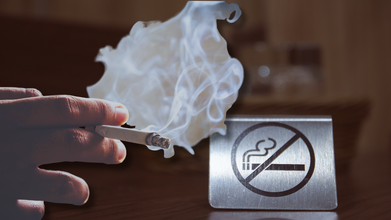- Health Conditions A-Z
- Health & Wellness
- Nutrition
- Fitness
- Health News
- Ayurveda
- Videos
- Medicine A-Z
- Parenting
- Web Stories
Donald Trump Appears Sweaty During ‘60 Minutes’ Interview, Prompting Health Concern

Credits: PBS
President Donald Trump, 79, appeared noticeably sweaty during an interview on CBS’s 60 Minutes, sparking concern and speculation about his health. The interview, filmed at Trump’s Mar-a-Lago resort on Friday, drew attention online, including from pro-Democratic influencer Harry Sisson, 23, whom Trump had previously targeted on his Truth Social account with an AI video depicting him being drenched during a “No Kings” protest.
Sisson reacted strongly to the president’s Sunday interview appearance: “He looks absolutely awful. He’s incoherent, rambling, and looks like he’s dripping in sweat. This man is not well!” His comments prompted many others on social media to weigh in.
Online Users Raise Health Concerns After Donald Trump’s 60 Minutes Interview
Harry Sisson, one of Trump’s most vocal critics, noted on X that the president “looks absolutely awful.” Sisson added, “He’s incoherent, rambling, and looks like he’s dripping in sweat. This man is not well!”
Other online users quickly speculated that something may be off with the president, who has faced persistent rumors about dementia in recent months. One wrote: “DJT actually looks like he has been sedated. The eyes are blank. He’s on so much medication to keep him going in addition to having dementia.”
Another user suggested that Trump may have suffered a stroke and is “easily losing it,” urging the public to “pray for him.”
Donald Trump Health Issues
When Trump returned to public appearances after his break in August, he was photographed with a bruised hand coated in makeup. The White House explained the mark as the result of “constantly working and shaking hands all day every day.”
During an event on September 11 commemorating the 24th anniversary of the 9/11 attacks, some observers raised concerns about Trump’s drooping facial expression, leading to online speculation about a potential stroke. Last month, Trump addressed his health publicly, mentioning he had received an MRI scan, which he described as “perfect.”
“I had an MRI, and it came back perfect,” he stated, as per CNN, giving no additional details. This comment came amid repeated questions to the White House about images showing the 79-year-old president’s swollen ankles and a bruised hand covered in makeup. It was also disclosed that he has been diagnosed with chronic venous insufficiency.
Donald Trump Stroke Issues
Former White House physician Jeffrey Kuhlman questioned the timing and results of Trump’s medical visit to Walter Reed Military Medical Center. The president was also pictured gripping the handrail tightly while descending Air Force One during a trip to Japan, fueling further concerns about his health during the five-day Asia trip.
Previously, Trump joked about needing caution on stairs during a speech at the U.S. Navy’s 250th anniversary, admitting he might “fall walking up or down a flight of stairs one day” but claiming he remains a better “physical specimen” than his predecessor, Joe Biden.
The United States has a long history of presidents concealing health issues. President Woodrow Wilson experienced multiple strokes during his time in office, while Franklin D. Roosevelt fell ill during his third term, with his personal physician continuing to describe his condition as “satisfactory.”
FDA’s Top Drug Regulator George Tidmarsh Resigns Amid Misconduct Probe

Credits: Biospace
The head of the U.S. Food and Drug Administration’s drug division abruptly stepped down on Sunday after federal authorities began investigating “serious concerns” about his personal conduct, according to an agency spokesperson. Dr. George Tidmarsh, who took over the position in July, was placed on administrative leave Friday after officials in the Department of Health and Human Services’ (HHS) Office of General Counsel were alerted to the matter, said HHS press secretary Emily Hilliard in an email statement. Tidmarsh submitted his resignation two days later.
“Secretary Kennedy expects the highest level of integrity from all officials under his leadership and remains fully committed to transparency,” Hilliard said.
Top FDA Drug Regulator Resigns Amid Misconduct Probe
Tidmarsh’s resignation coincided with a lawsuit filed by a pharmaceutical company tied to one of his former business associates. The company, Aurinia Pharmaceuticals, accused him of making “false and defamatory statements” while serving in his FDA role. The lawsuit claims Tidmarsh used his federal position to pursue a “personal vendetta” against Aurinia’s board chairman, Kevin Tang. Tang had previously sat on the boards of several biotech firms where Tidmarsh held executive roles, including La Jolla Pharmaceutical, and was allegedly involved in removing him from those posts.
In September, Tidmarsh questioned the safety and effectiveness of Aurinia’s lupus medication, Lupkynis, in a LinkedIn post that he later deleted. Aurinia maintains the drug is both safe and effective, citing results from two large clinical trials and its full FDA approval in 2021.
His exit comes amid a period of significant turnover within U.S. health agencies under Health Secretary Robert F. Kennedy Jr. Earlier this year, longtime vaccine official Peter Marks was dismissed, followed by gene therapy director Nicole Verdun.
In another leadership shake-up, Dr. Vinay Prasad, head of the FDA’s vaccines and biologics division, resigned in July after facing criticism from conservative groups close to former President Donald Trump but rejoined the agency two weeks later at Kennedy’s request.
Internal Strain at the FDA
The FDA’s drug division, previously overseen by Tidmarsh, has been struggling with heavy staff losses, more than 1,000 employees have reportedly left in the past year due to layoffs or resignations. The center is the agency’s largest branch, responsible for reviewing, approving, and monitoring the safety of both prescription and over-the-counter medicines.
In September, Tidmarsh sparked widespread attention after posting publicly on LinkedIn that Aurinia’s kidney drug “had not been shown to provide a direct clinical benefit for patients.” It is highly unusual for an FDA official to single out a specific company or product on social media.
Aurinia claims that Tidmarsh’s comments caused its stock to drop by 20%, erasing more than $350 million in shareholder value. Tidmarsh later deleted the post and stated that he had shared it in a personal capacity rather than as an FDA representative.
The company’s lawsuit also alleges that Tidmarsh targeted another drug, a thyroid medication produced by American Laboratories, where Tang also serves as board chair.
Filed in U.S. District Court in Maryland, the lawsuit seeks both compensatory and punitive damages, as well as a chance to “set the record straight,” according to Aurinia Pharmaceuticals.
Scientists Urge Cancer Warning Labels On Meat Products Sold In The UK; Here's Why

Credits: Canva
Bacon and ham sold in the UK should carry warning labels similar to those found on cigarette packets, urging consumers to be aware that the chemicals they contain may cause bowel cancer, scientists have said. Researchers have criticised successive British governments for doing “almost nothing” to cut risks from nitrites in the ten years since these compounds were confirmed as carcinogenic.
Calls for Health Warnings On Popular Meats In The UK
It has been nearly a decade since the World Health Organization’s International Agency for Research on Cancer (IARC) identified processed meat as a Group 1 carcinogen, a classification given when there is strong evidence that a substance can cause cancer. This places products like bacon and ham in the same category as tobacco and asbestos.
Despite this, the UK government continues to face pressure to regulate or ban nitrite preservatives used in many processed meats. These additives help meat retain its pink colour, enhance taste, and prevent spoilage, but they are now believed to contribute to tens of thousands of cancer cases in the UK every year. Once consumed, nitrites can convert into compounds known as nitrosamines, which are powerful carcinogens capable of damaging DNA, the genetic code that directs cell growth and division.
What Are Nitrosamines?
Nitrosamines are chemical compounds that can form when certain amines react with nitrites or other nitrosating agents. They are considered probable human carcinogens because of their ability to harm DNA. Nitrosamines can occur in cured and grilled meats, drinking water, and even some medications, prompting recalls and regulatory action in the past.
What Is a Carcinogen?
According to the Cleveland Clinic, a carcinogen is any substance or agent that can cause cancer by altering or damaging a cell’s DNA. Carcinogens can be natural or man-made and include physical factors such as ultraviolet radiation, chemical agents like asbestos or tobacco smoke, and biological elements such as certain viruses. While exposure increases the likelihood of developing cancer, it does not mean cancer will always occur.
Is Meat Consumption Leading to Cancer Cases in the UK?
Inside the body, nitrosamines can attach to DNA in the liver, forming DNA adducts, small chemical bonds that distort genetic structure. This damage can lead to mutations that, over time, allow abnormal cell growth and tumour formation, especially in the colon.
These compounds can also trigger internal stress by generating reactive oxygen species, unstable molecules that cause further DNA harm. This combination of oxidative stress and genetic instability is a known pathway in cancer development and progression.
Experts estimate that nitrites in processed meats have been linked to about 54,000 cases of colorectal cancer in the UK over the past decade. Since the IARC’s 2015 classification, the scientific evidence reinforcing this connection has grown even stronger. New studies continue to show a clear relationship between eating processed meat and increased bowel cancer risk. Other research has found that women who eat processed meats weekly face a higher likelihood of breast cancer compared with those who don’t.
The greatest danger comes from meats treated with nitrites. In response, the European Union has tightened its food safety standards, lowering allowable nitrite levels and promoting safer alternatives.
Are Nitrites Really Necessary for Meat Safety?
Food manufacturers who oppose stricter rules claim that removing nitrites could increase bacterial contamination risks. However, many scientists and food safety experts disagree, saying that with current refrigeration and hygiene standards, it is entirely possible to produce safe cured meats without nitrites.
A Call for Preventive Action
Health advocates argue that the UK government should take stronger steps by phasing out harmful preservatives and improving product labelling to help consumers make informed decisions. They note that post-Brexit Britain now trails the EU in food safety regulations, where stricter nitrite limits are already in place.
From a public health standpoint, dietary carcinogens such as nitrites are seen as a preventable cause of cancer. Cutting exposure could help reduce the country’s overall cancer burden and ease pressure on healthcare services.
Smoking Banned In Maldives For People Born After 2007

(Credit-Canva)
The Maldives has made history by creating the world's first law that stops a whole generation of young people from ever smoking. This new rule started on November 1st, after the country's President, Mohamed Muizzu, suggested it earlier this year.
This landmark ban affects everyone living in the Maldives who was born on or after January 1, 2007. Essentially, if you belong to this generation, you are now legally banned from ever smoking, buying, or using any type of tobacco product.
Also Read: Taking Ozempic, Wegovy, or Mounjaro? Experts Warn Of Rare But Severe Reaction
Who Is No Longer Permitted To Smoke In Maldives?
The new law is very clear: it makes it illegal for an entire group of young people to use or buy any form of tobacco, including cigarettes. Shops that sell products must now check the ID of customers to make sure they are old enough to buy tobacco.
The Ministry of Health announced that this is a "huge moment in history" for the country. They say the goal is to protect everyone's health and make sure this new generation can grow up completely free from tobacco. The Ministry added that the ban shows the government is serious about keeping young people safe from the dangers of smoking.
This new smoking ban fits with rules that Maldives already had in place. The country already has a complete and total ban on e-cigarettes and vaping products. It is illegal to bring them in, sell them, own them, or use them, no matter how old you are. The new generational ban simply strengthens the country's overall fight against all nicotine products.
Also Read: What Really Happens In Your Brain During Deep Sleep?
Do Smoking Bans Help Public Health?
According to the World Health Organization, tobacco is responsible for 1.1 million deaths each year, just in the WHO European Region, and 153,000 people die due to exposure to second-hand smoke.
They explain that tobacco in any form is deadly, even second hand smoke is a major contributor to non-communicable diseases like heart diseases, lung cancer, diabetes and stroke etc.
Previous studies have also found that smoking bans do benefit public health. A 2009 study published in the Journal of the American College of Cardiology found that banning smoking in public places significantly reduces the risk of heart attacks. This is especially true for younger people and nonsmokers.
- They found that these bans can cut the number of heart attacks by up to 26 percent each year.
- Researchers explained that even breathing in a small amount of cigarette smoke can raise your risk of a heart attack.
They pointed out that the smoking bans seem very effective because secondhand smoke is very harmful to the heart. While smoking directly doubles the risk of a heart attack, being exposed to secondhand smoke increases the risk by 30 percent. Dr. Meyers added that if a nationwide ban were put in place, it could prevent as many as 154,000 heart attacks annually in the U.S.
How Quickly Do Smoking Bans Show Results?
The study found that smoking bans start helping people almost right away. The beneficial effects begin to appear within just three months of the ban starting, with fewer reported heart attack cases. Researchers believe secondhand smoke increases the risk of heart attacks in a few ways:
- It makes the blood "sticky", which makes it easier for dangerous clots to form.
- It lowers the amount of "good" (HDL) cholesterol in the body.
- It makes people more likely to have dangerous heart rhythms.
The smoking bans were shown to be particularly effective in reducing heart attacks among women and younger individuals. The experts suggest this might be because younger people often spend time in places like bars, clubs, and restaurants where smoking used to be common. People who work in those places, such as the hospitality industry, are often the most exposed to smoke and therefore get the greatest benefit from the ban.
© 2024 Bennett, Coleman & Company Limited

